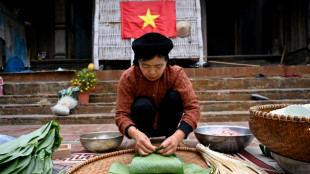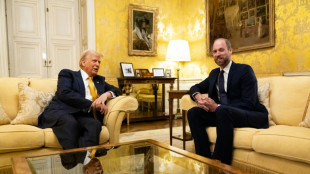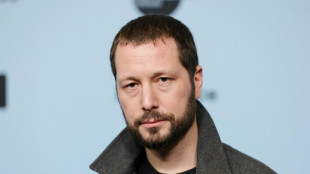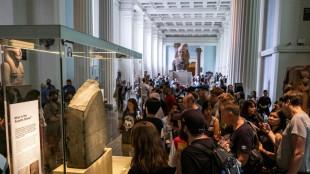
-
 Israeli fire kills 2, wounds 32, on deadline for Lebanon withdrawal
Israeli fire kills 2, wounds 32, on deadline for Lebanon withdrawal
-
Brathwaite half century lifts West Indies to 129-5 against Pakistan

-
 Siniakova wins 10th Grand Slam doubles title at Australian Open
Siniakova wins 10th Grand Slam doubles title at Australian Open
-
Brazil slams US after dozens of deportees arrive handcuffed

-
 Trump floats plan to 'clean out' Gaza as fragile truce enters second week
Trump floats plan to 'clean out' Gaza as fragile truce enters second week
-
Welsford wins third stage as Narvaez takes out Tour Down Under

-
 US-bound refugees in Hong Kong despair as Trump halts arrivals
US-bound refugees in Hong Kong despair as Trump halts arrivals
-
Polls open in Belarus with Lukashenko set to extend 30-year rule

-
 Trump floats plan to 'just clean out' Gaza
Trump floats plan to 'just clean out' Gaza
-
Celtics top Mavs in NBA Finals rematch, Rockets down Cavaliers

-
 Belarusians near Ukraine border long for end to war
Belarusians near Ukraine border long for end to war
-
Lukashenko: Belarus's unpredictable autocrat and Putin sidekick

-
 'You pay my bills' and 'kick him out': Australian Open storylines
'You pay my bills' and 'kick him out': Australian Open storylines
-
How Keys banished fear of failure to shine on the Grand Slam stage

-
 Emergency UN meeting to convene as deadly fighting escalates in DR Congo
Emergency UN meeting to convene as deadly fighting escalates in DR Congo
-
Lukashenko set to extend 30-year rule in Belarus

-
 Indigenous rights activists protest on Australia Day
Indigenous rights activists protest on Australia Day
-
US Fed prepares to pause in first rate decision since Trump's inauguration

-
 Trump's Canada, Mexico tariff threat aimed at gaining leverage in trade talks: experts
Trump's Canada, Mexico tariff threat aimed at gaining leverage in trade talks: experts
-
Sticking with tradition: Vietnam's glutinous 12-hour Tet cake

-
 Trump casts chill over US wind energy sector
Trump casts chill over US wind energy sector
-
Israel poised to miss deadline for Lebanon pullout

-
 Fragile Gaza truce enters second week
Fragile Gaza truce enters second week
-
Royal diplomacy: how UK govt will seek to charm Trump

-
 Rubio threatens bounties on Taliban leaders over detained Americans
Rubio threatens bounties on Taliban leaders over detained Americans
-
English hangs on at tough Torrey Pines for fifth US PGA Tour title

-
 The Now Corporation (OTC:NWPN) Clarifies Misleading Information Regarding Solana, Cryptocurrency, and Fraudulent Social Media Accounts
The Now Corporation (OTC:NWPN) Clarifies Misleading Information Regarding Solana, Cryptocurrency, and Fraudulent Social Media Accounts
-
CIA says Covid 'more likely' to have leaked from lab

-
 DRCongo recalls diplomats from Rwanda as M23 forces threaten Goma
DRCongo recalls diplomats from Rwanda as M23 forces threaten Goma
-
Mbappe treble extends Liga leaders Real Madrid's edge on Atletico

-
 NKorea test-fires sea-to-surface strategic cruise missile: KCNA
NKorea test-fires sea-to-surface strategic cruise missile: KCNA
-
Berdeu last-gasp effort stuns Top 14 leaders Bordeaux-Begles

-
 PSG held as Kvaratskhelia makes debut
PSG held as Kvaratskhelia makes debut
-
Mbappe treble helps Liga leaders Real Madrid down Valladolid

-
 Wembanyama and Spurs fall to Haliburton-inspired Pacers in Paris
Wembanyama and Spurs fall to Haliburton-inspired Pacers in Paris
-
Sinner faces Zverev test in 'perfect' Australian Open final

-
 Guardiola backs Khusanov to learn from nightmare Man City debut
Guardiola backs Khusanov to learn from nightmare Man City debut
-
13 peacekeepers killed as fighting rages in eastern DRCongo

-
 Monaco back on Ligue 1 podium as Lille lose
Monaco back on Ligue 1 podium as Lille lose
-
Tens of thousands protest Germany's far right as Musk backs AfD

-
 Cheika unhappy with referee O'Keeffe's role as Gloucester tame Tigers
Cheika unhappy with referee O'Keeffe's role as Gloucester tame Tigers
-
From Ukraine trenches to Russia schools, Sundance docs show toll of war

-
 Haaland sees 'something special' in Man City new boy Marmoush
Haaland sees 'something special' in Man City new boy Marmoush
-
'Quite an achievement' as Everton's Moyes marks 700 Premier League games

-
 Wembanyama's Spurs fall to Pacers in Paris
Wembanyama's Spurs fall to Pacers in Paris
-
Haaland leads Man City revival to beat Chelsea

-
 Israelis rejoice at release of second group of Gaza hostages
Israelis rejoice at release of second group of Gaza hostages
-
Ogier slogs through the mud to keep Monte Carlo lead

-
 Swiss sailor Mettraux becomes fastest female Vendee finisher
Swiss sailor Mettraux becomes fastest female Vendee finisher
-
Man Utd flop Antony joins Betis on loan


With new 'Aida' staging, Met tries out grandiose opera for the contemporary age
"Aida" has long epitomized opera at its most extravagant -- think sweeping sets, luxurious costumes and even real-live horses, an experience intended to transfix the audience with grandeur.
A beloved version of that scale helmed the Met for more than three decades -- so staging a new production of "Aida," a tale of love, war and loyalty set in ancient Egypt, was a tall order.
"Because Aida is so big and so expensive... I did definitely feel the pressure of that," director Michael Mayer told AFP in a recent interview of his production that premiered this month, adding that "I knew that there were audiences who wanted the big spectacle."
Verdi's "Aida" also has long faced criticism of Orientalism, that it offers an exoticized, reductive view of Egypt through an othering Western lens.
Addressing that was among Mayer's tasks -- to "acknowledge, even in a gentle way, the kind of imperialism and colonialism associated with a kind of fetishization of ancient Egypt," he told AFP.
"When you look at the history of Grand Opera, you see a lot of operas that are set in exotic locales," he said, citing "Aida" along with "Madama Butterfly," set in Japan, and "Turandot," set in China, as prime examples.
"There's the sense that that those cultures could be fetishized. We appreciate the beauty of them, but in modern times now, I think we're all much more conscious of Orientalism and colonialism and imperialism and the idea that these cultures were taken apart and reappropriated -- and potentially inappropriately so," Mayer said.
"And I think that contemporary audiences are not going to just swallow it hook, line and sinker, without some kind of acknowledgement that there's a complexity involved."
- 'Fresh and new' -
Mainstream critics of the new production have been, well, critical -- but refreshing a pillar of traditional opera is a delicate balance, Mayer said.
And part of that balance is toeing the line between reaching new opera-goers and satisfying the old guard -- or, how to revamp a traditional opera for a contemporary age, without losing what made it adored to begin with.
And on top of that, it has to have staying power -- a staple of the repertoire that can satiate audiences for seasons to come.
Mayer's approach to the piece involves presenting it through the eyes of a team of archaeologists unearthing an ancient tomb, before the tale of star-crossed lovers, warring empires and treason unfolds in full color.
At one point, the archaeologists are seen looting the tomb of its treasures, a reminder of the colonial context.
"I feel like my job was to be able to deliver the beautiful spectacle that audiences who love that about 'Aida' could get" he said, while also aiming to "contextualize it."
"My dream is that I can give everyone enough that it will turn them on, maybe for the first time," said Mayer, a director who in addition to working in opera has long worked on Broadway.
"I feel like if someone's coming to the opera for the first time, and they're seeing this 'Aida,' and they're like, 'Oh my God, that's like a Broadway show on crack, I can't wait to come back' -- then I feel like mission accomplished," he said.
Capturing the hearts of those audiences is vital for the art -- and the bottom line of institutions like the Met.
"The future of the opera in America is really in the hands of the young people," Mayer said.
"They have to feel like they're seeing something fresh and new," he continued, "and not living their fear, which is that they're going to go and see a museum piece that has nothing to say to them and has nothing to say to the moment that we're in."
S.Jackson--AT


